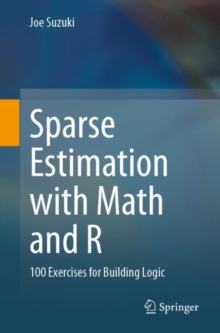Description
| Product ID: | 9789811614453 |
| Product Form: | Paperback / softback |
| Country of Manufacture: | GB |
| Title: | Sparse Estimation with Math and R |
| Subtitle: | 100 Exercises for Building Logic |
| Authors: | Author: Joe Suzuki |
| Page Count: | 234 |
| Subjects: | Mathematical logic, Mathematical logic, Probability and statistics, Algorithms and data structures, Machine learning, Probability & statistics, Algorithms & data structures, Machine learning |
| Description: | Select Guide Rating The most crucial ability for machine learning and data science is mathematical logic for grasping their essence rather than knowledge and experience. This textbook approaches the essence of sparse estimation by considering math problems and building R programs. Each chapter introduces the notion of sparsity and provides procedures followed by mathematical derivations and source programs with examples of execution. To maximize readers’ insights into sparsity, mathematical proofs are presented for almost all propositions, and programs are described without depending on any packages. The book is carefully organized to provide the solutions to the exercises in each chapter so that readers can solve the total of 100 exercises by simply following the contents of each chapter. This textbook is suitable for an undergraduate or graduate course consisting of about 15 lectures (90 mins each). Written in an easy-to-follow and self-contained style, this book will also be perfectmaterial for independent learning by data scientists, machine learning engineers, and researchers interested in linear regression, generalized linear lasso, group lasso, fused lasso, graphical models, matrix decomposition, and multivariate analysis. This book is one of a series of textbooks in machine learning by the same author. Other titles are: - Statistical Learning with Math and R (https://www.springer.com/gp/book/9789811575679)- Statistical Learning with Math and Python (https://www.springer.com/gp/book/9789811578762)- Sparse Estimation with Math and Python The most crucial ability for machine learning and data science is mathematical logic for grasping their essence rather than knowledge and experience. This textbook approaches the essence of sparse estimation by considering math problems and building R programs. Each chapter introduces the notion of sparsity and provides procedures followed by mathematical derivations and source programs with examples of execution. To maximize readers'' insights into sparsity, mathematical proofs are presented for almost all propositions, and programs are described without depending on any packages. The book is carefully organized to provide the solutions to the exercises in each chapter so that readers can solve the total of 100 exercises by simply following the contents of each chapter. This textbook is suitable for an undergraduate or graduate course consisting of about 15 lectures (90 mins each). Written in an easy-to-follow and self-contained style, this book will also be perfect material for independent learning by data scientists, machine learning engineers, and researchers interested in linear regression, generalized linear lasso, group lasso, fused lasso, graphical models, matrix decomposition, and multivariate analysis. This book is one of a series of textbooks in machine learning by the same author. Other titles are: - Statistical Learning with Math and R (https://www.springer.com/gp/book/9789811575679) - Statistical Learning with Math and Python (https://www.springer.com/gp/book/9789811578762) - Sparse Estimation with Math and Python |
| Imprint Name: | Springer Verlag, Singapore |
| Publisher Name: | Springer Verlag, Singapore |
| Country of Publication: | GB |
| Publishing Date: | 2021-08-05 |


